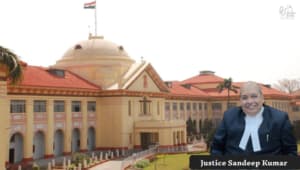Vice President of India, Jagdeep Dhankhar, has voiced strong disapproval of a recent Supreme Court judgment that directed the President of India to act within a specific timeline on Bills referred by the Governor. He described this direction as an overreach of judicial powers and criticized the use of Article 142 of the Constitution, calling it a "nuclear missile" being wielded by the judiciary against democratic institutions.
"There is a directive to the President by a recent judgment. Where are we heading? What is happening in the country?" – Vice President Jagdeep Dhankhar
Speaking to the 6th batch of Rajya Sabha interns, Vice President Dhankhar expressed concern over the expanding role of the judiciary in executive and legislative domains. He emphasized that such interventions compromise the balance of powers enshrined in the Constitution.
Read Also:- SC Rules: Overruling Judgments Apply Retrospectively Unless Specified Otherwise
"We never bargained for democracy for this day. President being called upon to decide in a time-bound manner, and if not, it becomes law. So we have judges who will legislate, perform executive functions, act as a super-Parliament, and remain unaccountable," he remarked.
Dhankhar highlighted that Article 145(3) mandates that substantial constitutional questions must be adjudicated by a bench comprising at least five judges. Yet, in the case he referred to, the decision was delivered by a two-judge bench. He called for a revision of Article 145(3), arguing that the increase in the total number of Supreme Court judges from eight to thirty-one necessitates a larger Constitution Bench.
"We cannot have a situation where you direct the President of India and on what basis? The only right you have under the Constitution is to interpret it under Article 145(3)... Article 142 has become a nuclear missile against democratic forces, available to judiciary 24x7," he said.
Read Also:- Charges Framed Cannot Be Deleted Using Section 216 CrPC or Section 239 BNSS: SC Rules
The Vice President was referring to a Supreme Court judgment involving the Tamil Nadu Governor’s delay in granting assent to State Assembly Bills. The Court had not only set a timeline for the Governor’s action but also applied the same to the President’s decisions under Article 201. The judgment stated that if the President fails to act within the stipulated timeframe, the concerned State can seek a writ of mandamus from the Court.
Additionally, the Court stated that if a Governor refers a Bill to the President citing unconstitutionality, the President should seek the Supreme Court’s opinion under Article 143 before taking a final decision.
Judiciary in the Spotlight: The Justice Yashwant Varma Episode
The Vice President also alluded to a recent controversy involving Justice Yashwant Varma, where cash was reportedly found at the judge’s residence. The incident, which occurred on the night of March 14th and 15th in New Delhi, was not publicly known for an entire week.
"For seven days, no one knew about it. We have to ask ourselves – is the delay explainable? Is it condonable? Doesn’t it raise serious fundamental questions?" he asked.
Read Also:- SC Quashes Defamation Case Against Homebuyers for Peaceful Protest Against Builder
He pointed out that the public was made aware of the incident only on March 21st, following a media report, which left citizens across the country "shocked as never before."
"Fortunately, an authoritative source — the Supreme Court — did provide input, which indicated culpability. It wasn’t just a suspicion; it clearly showed something was wrong and needed investigation. Now the nation waits with bated breath," Dhankhar said.
He also questioned why no FIR was registered in the matter and raised concerns over the judicial panel’s ongoing inquiry, which has not made its findings public. He emphasized that judges should not investigate themselves, and highlighted the issue of undeclared judicial assets, raising concerns about transparency and accountability.
"How can investigation be the job of the judiciary?" he asked, underlining the urgent need for checks and balances even within the judicial system.















